What your houseplant says about your personality [survey]

Key takeaways:
- Highly extroverted people owned 6.8 houseplants, on average. The average person owned five houseplants
- People who owned 5+ plants were happier and more productive than those with fewer plants
- 38% of people surveyed reached a point where they stopped caring for a plant
What your houseplant says about your personality
After nearly a full year in lockdown, some purchases became nearly synonymous with life during the COVID-19 pandemic, ranging from toilet paper and at-home exercise equipment to solutions for cooking and eating at home when dining out was no longer an option. And while their popularity may have been growing before the pandemic hit, there's no doubt that spending so much time inside accelerated the buying of another type of product, too: houseplants.
Enabling a connection with nature at a time when so much of our daily routines had shifted and changed, the houseplant boom didn't just provide an opportunity for people to spruce up their living spaces, it encouraged a hobby that promoted learning and growth. It's probably no small coincidence that even just looking at houseplants can also help reduce stress.
Of course, not all houseplant preferences are the same, and keeping some flora alive can be more difficult for some. To better understand why people gravitate toward specific species of plants, we surveyed over 1,000 people about their houseplant experience and compared that data to their Big Five Personality Test. From fiddle leaf figs to succulents and cacti, read on as we explore how certain personality traits can be linked to plant preferences, greener thumbs and how much money people are shelling out for their new nature-based hobby.
Personality traits and houseplants
As the name suggests, the Big Five Personality Test ranks five core traits – openness to experience, conscientiousness, extraversion, agreeableness and neuroticism – on a continuous scale. As we discovered, there are a number of ways those traits could be linked to both enthusiasm for houseplants and preferences for certain types of plants. Overall, people who scored highly in extraversion (6.8 plants) and openness (6.1) owned the highest number of houseplants, on average, while those scoring higher in agreeableness (5.8) and neuroticism (5.4) had the least.
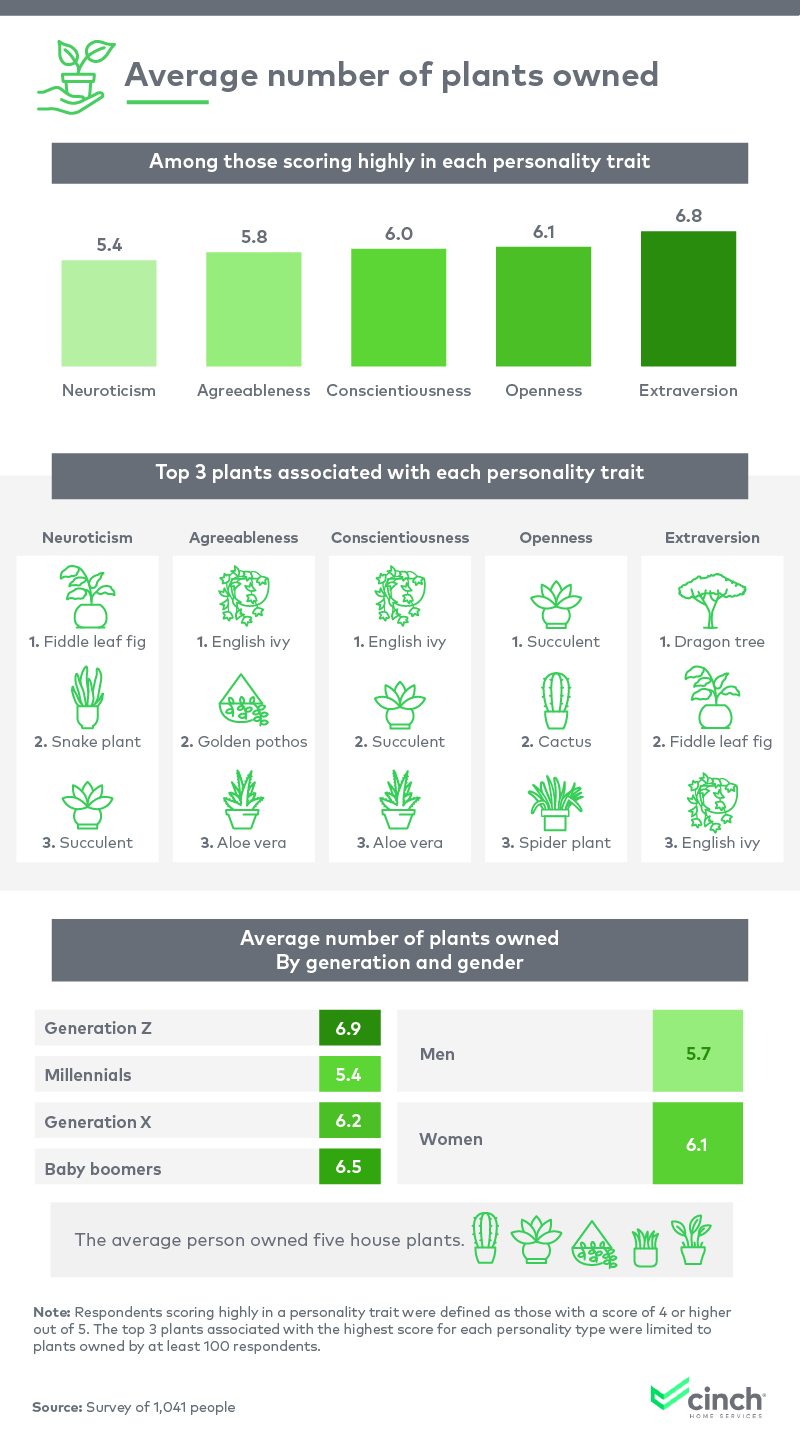
People who scored higher in neuroticism were the most likely to be associated with the fiddle leaf fig plant. Despite its popularity, the fiddle leaf is notorious as one of the most difficult plants to keep alive, requiring the perfect balance of both water and sun exposure to maintain its ideal tropical climate. Potentially perfect for those with more neurotic tendencies, you'll also need to make sure you're cleaning the individual leaves, using the right kind of water and avoiding drafts wherever possible if you want your FLF to thrive.
In contrast, people scoring higher in agreeableness and conscientiousness were more inclined toward English ivy, while those with high scores in openness opted for succulents, cacti and spider plants. People with more extraverted personality types leaned toward dragon trees, fiddle leaf figs and English ivy.
And while the boom in houseplants might be commonly associated with millennials, that may not be entirely accurate from a generational perspective. Among those surveyed, Generation Z averaged the highest number of houseplants (6.9), followed by baby boomers (6.5), Gen X (6.2) and millennials (5.4).
A growing interest in greenery
When asked to compare their recent houseplant purchasing to before the COVID-19 pandemic began, 43% of people said they owned more plants currently than before the pandemic, although increased enthusiasm was higher among Gen Z (52%) and millennials (44%) than older generations.
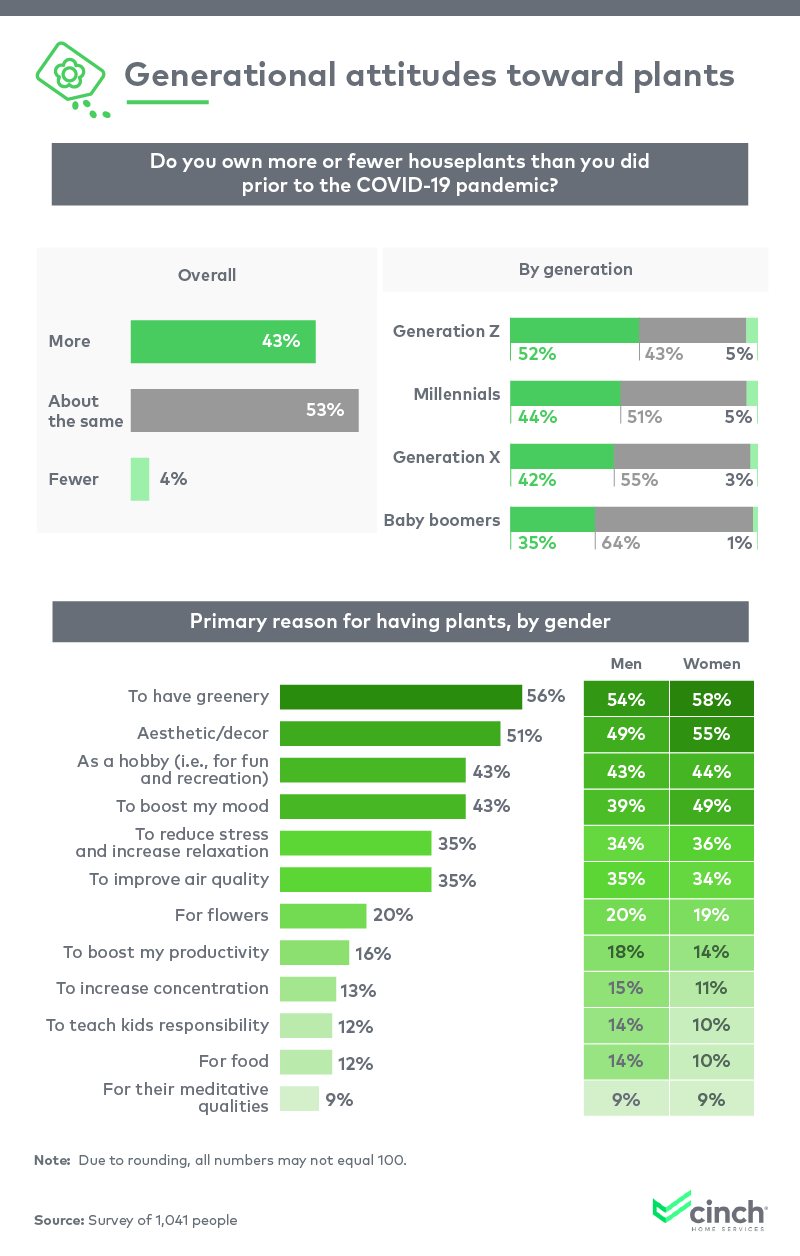
So what are the most popular reasons for owning houseplants in the first place? Having more greenery around (56%), the decor aesthetic (51%), as a hobby (43%), as a mood booster (43%) and to reduce stress (35%) were the most popular reasons people took up the mantle of caring for plants. Particularly during the winter months when you may not be spending as much time outside, some houseplants can help create a more relaxing environment, including the mental health benefits of reducing stress and boosting feelings of happiness.
The cost of a green thumb
As with any hobby, there's always a certain cost associated with picking up a new craft or collection. When it comes to houseplants, there's the cost of the plants themselves but also soil, pots, nutrients and plant food to name a few. Depending on the types of plants you bring home, there may even be the added cost for things like humidifiers or water filtration systems to recreate climates that may not be native to your home.
In the last year, people reported spending an average of $60 on plants, though men ($80) spent 33% more, on average, compared to women ($60). Generation Z respondents, who also reported buying more plants during the COVID-19 pandemic than any other generation, also spent the least, averaging $50. If you're looking to grow your collection without breaking the bank, shopping online can be a savvier solution than buying in-store at nurseries or plant shops.
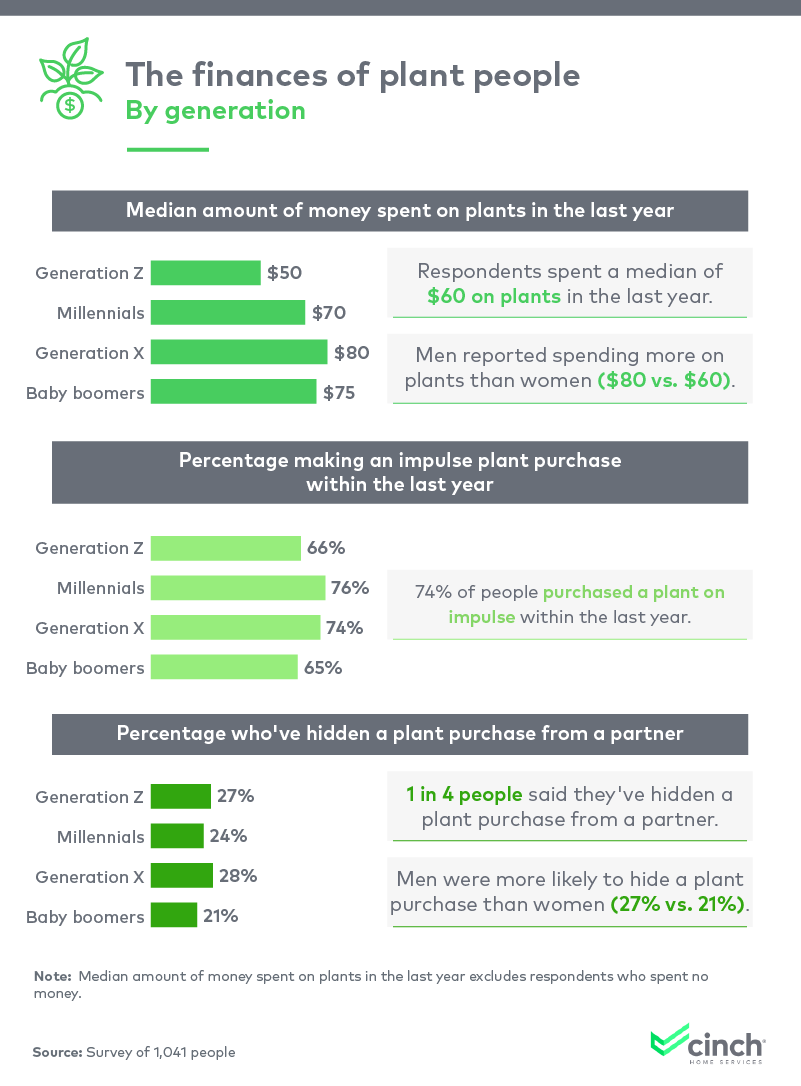
Millennials (76%) and Generation X (74%) respondents were the most likely to admit to making an impulsive plant purchase in the last year, and it was Generation X (28%) and Gen Z (27%) who were the most likely to have hidden a plant purchase from their partner. There may not be any scientific evidence to support a limit on the correct number of plants to bring into your home, but your significant other may certainly have an opinion on when you've reached the threshold.
Keeping plants alive
Even the most low-maintenance foliage (we're looking at you, snake plant) needs a certain routine of care that typically involves water, sun, and the occasional repotting. For some plants, this routine can be far more involved, including figuring out how and when to use plant nutrients, fertilizing, rotating, misting and more. Perhaps unsurprisingly, not all plants are destined to flourish in home environments, and not every thumb is green enough to keep them alive. Overall, 38% of people admitted to giving up on caring for a houseplant at some point in the past. Houseplant homicide was highest among those who scored high in neuroticism (33%), compared to conscientiousness (20%), extraversion (20%), openness (22%) or agreeableness (22%).
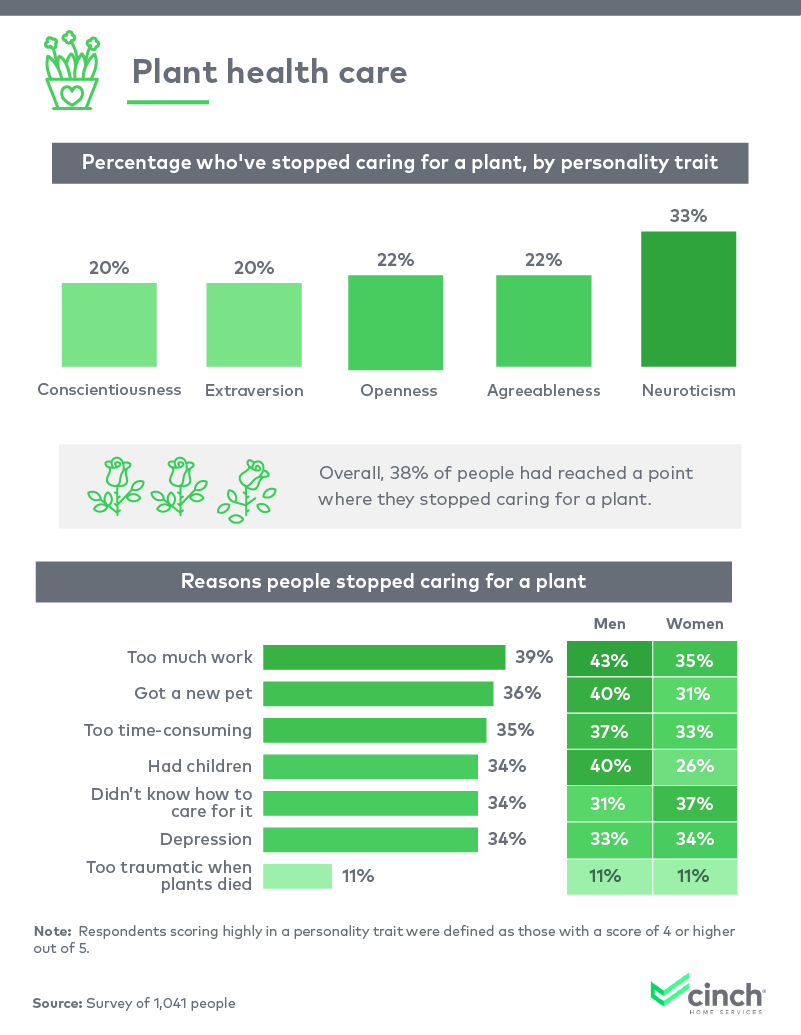
So why do people give up on their houseplants? Thirty-nine percent of respondents claimed they were too much work, followed by those who acknowledged plants took a lower priority because they got a pet (36%), they were too time-consuming (35%) or they had kids (34%). Men (40%) were more likely than women to give up on their plants in favor of pets (31%) or children (26%). Another 34% of people reported they stopped caring for their plants because they simply didn't know how to, and just as many said they stopped because they became depressed.
Perks of plant life
Unless your plants are made out of plastic, there's a level of time and money involved in keeping them alive and thriving. So is it really worth it in the end, and should you consider investing in multiple plants and expanding your indoor greenery?
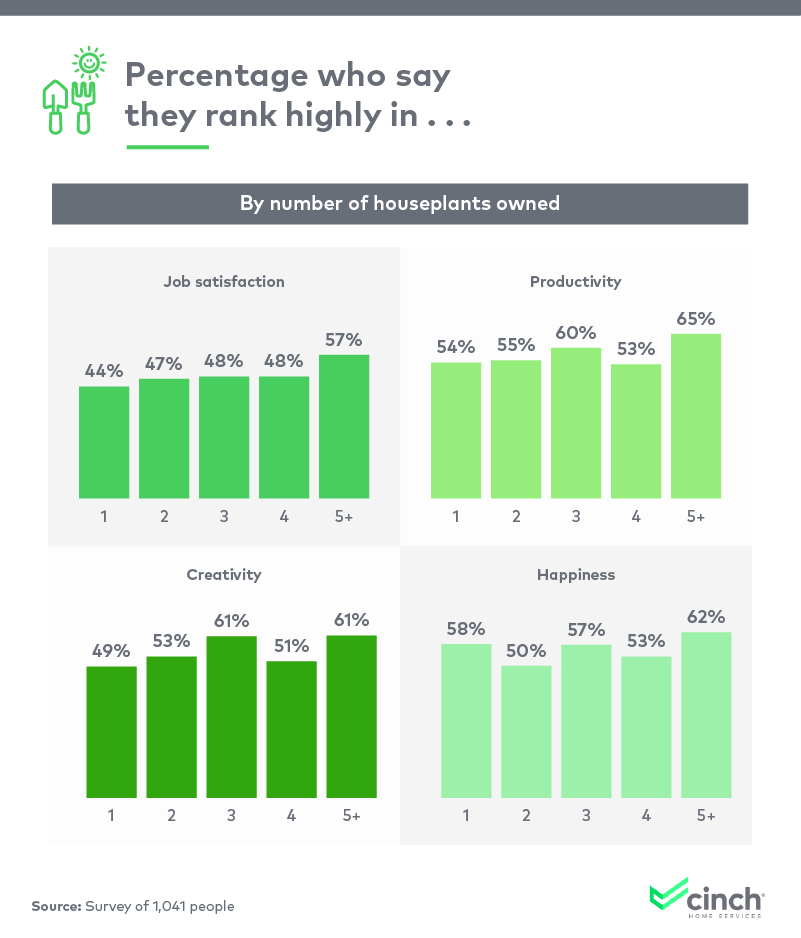
When asked about various aspects of their life, people with five or more plants were more likely to indicate feeling satisfied with their jobs, productivity, happiness and creativity (which tied with those with three plants). With so many people working remotely following COVID-19 lockdowns, it's possible that having plants at home could be more beneficial than ever. Having more plants around that you can look at from your home office may be able to help reduce stress and keep your mood elevated throughout the workday.
Which plant are you?
Curious about which plant is the perfect match for you and your personality? Take the quiz below to find out! Results "stem" from the Big Five Personality Test's five core traits – openness to experience, conscientiousness, extraversion, agreeableness and neuroticism.
Keeping things fresh
Even before 2020, the popularity of houseplants was booming. While people might not always know how to care for them in the beginning, cultivating and growing houseplants is the kind of hobby anyone can get into. Bolstered by the pandemic – and being stuck inside more than they were used to – many people reported buying even more houseplants in the last 18 months, possibly to the point of having to hide their purchases from their significant other. Still, people we polled reported being happier and more creative and content with their jobs when they had five or more houseplants, so it's possible the more green you have in your home the better!
At Cinch Home Services, another thing we like to keep fresh is your home protection plan. Affordable and award-winning, the Cinch protection plan home warranty helps you manage and control the cost of appliance and system breakdowns in your home. With our plans, you can request service if something breaks down and we'll send a verified pro to your home to fix it – it's as simple as that. Get help when you need it; learn more about Cinch online today.
Methodology and limitations
We surveyed 1,041 people, including 110 baby boomers, 270 Gen Xers, 569 millennials, 67 Gen Zers and 25 respondents who did not provide their age. Respondents were 42% women, 55% men and 1% nonbinary. Two percent of respondents chose not to disclose their gender.
For the personality traits, respondents with a score of 4 or higher (out of 5) were considered to have a high score in that trait. Out of all our respondents, 416 scored high in agreeableness, 503 scored high in conscientiousness, 167 scored high in extraversion, 152 scored high in neuroticism and 347 scored high in openness.
Survey data have certain limitations related to self-reporting. These limitations include, but aren't limited to, telescoping, exaggeration and selective memory. We didn't weight our data or statistically test our hypotheses. This was a purely exploratory project that examines the relationship between personality traits and plant-buying habits.
Fair use statement
Want to help propagate these findings? We encourage you to share the results of this leafy-green survey with your readers for any noncommercial use. Just include a link back to this page so they have access to all of our findings and methodology.
